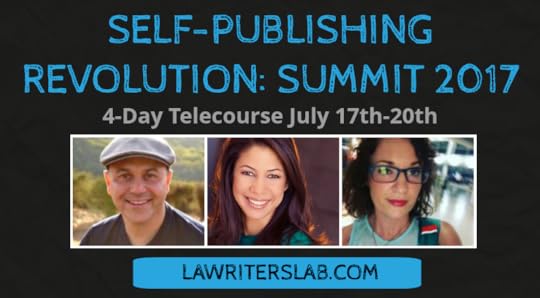Alan Watt's Blog, page 12
June 28, 2017
Writing the Middle

For all you first-time writers struggling with the middle of your story, here’s something to remember.
Our idea of our novel is never the whole story.
The solution to getting through the middle of your first novel or memoir is to remove your focus from the “plot” and place it squarely on your character’s dilemma.
A dilemma is a problem that can’t be solved without creating another problem.
By focusing on the dilemma that your character is struggling with (he may not even be conscious of it — probably isn’t at this point), you will be pulled directly into the conflict, and new possibilities will emerge.
Writers sometimes struggle with realizing how incredibly malleable story actually is. Let your characters lead the way. Focusing on my protagonist’s dilemma changed the way I approach story.
Keep going!
Let me know your thoughts.
June 26, 2017
Simplicity in Writing

Forward, he cried
From the rear
And the front ranks died.
– Pink Floyd (Us and Them)
Hi Writers,
We can tell a whole world in a sentence. The rewrite is where we polish our prose until it gleams. We remove all that does not belong in order to experience what remains. In the rewrite, we ask ourselves, “Is this word or sentence necessary?” A single word can kill a sentence, can cloud its meaning, and halt the rhythm.
Ernest Hemingway wrote a six-word short story. It has a beginning, middle, and end. It tells us all we need to know and our imagination fills in the rest. Here it is.
“For Sale. Baby shoes. Never worn.”
Let’s tell our story, and nothing more.
June 21, 2017
Finishing Your Novel: 5 Tips to Get You to the End

For all you writers struggling somewhere in the middle of your manuscript, here are five tips to get you to the end.
1) Create a deadline for yourself.
Think of a practical timeframe to complete your work. If you’re going to be a first-time novelist, you’re going to need a first draft to work with.
2) Do not go back and read what you’ve written.
Especially for a first-time novelist, understand that rewriting follows the first draft. You need to keep that internal editor turned off.
3) Give yourself permission to write poorly.
Don’t concern yourself with perfecting your prose. The biggest mistake writers make is spending years crafting prose that will not survive the rewrite because it’s not intrinsic to the story.
4) Don’t concern yourself with filling in every narrative hole at this point.
There may be areas that feel sketched in. Don’t worry. Your sole goal is to get to the end.
5) Make a promise that you will reward yourself with a celebration upon completion.
You’ve asked something big of your unconscious, and it has delivered. We must keep our word with our muse.
Let me know your thoughts.
June 19, 2017
The Writer’s Place

I believe there is something we writers are collectively seeking; we are all attempting to convey an experience, a true moment, to tell a story that somehow reveals more than what we thought we knew. We are seeking to write something that after having written it, we can ask without guile, “Where did that come from?”
I wrestled for a little over a decade with trying to do it my way. I couldn’t. It was only after I had had what I call a “third act experience” that I began to glimpse the mystery. The mystery is that the story is being told through me, and that my technique or skill as a writer seems connected simply to my capacity for wonder, my willingness to be curious, to question everything, and to never settle for convention.
In our hero’s journey, the end of the second act is often the moment that our hero lets go of his idea of what he thinks he wants. This idea is surrendered because he sees its impossibility under his current circumstances. I think of this surrender as being like a coin with two sides. We surrender because we have no choice. We recognize the impossibility of ever getting what we want, and we let it go. We let go of the pain of our desire, which does not mean that we give up our wanting. Instead, our hero reframes his want. He gives it a different meaning, and in doing so, it becomes possible for our hero to get what he wants, if what he wants belongs in his life.
The creative act seems to demand of us in some way to be just a tiny bit more humble than we were yesterday. (Humility has nothing to do with feeling small or humiliated). Humility is about being restored to reality, and the reality (as I see it) is that we are all simply channels for the divine. The divine is not a specific voice, it is the power of the sun as it passes through us, lighting us from within. When we approach story in this way, we maintain an objective distance and are able to explore with great specificity the reality of our fictive-world, and our work becomes a gift, a roadmap for whomever wishes to make use of it.
Let me know your thoughts.
June 14, 2017
The Value of an Outline
A lot of writers want to dive right into their first drafts and start amassing pages. Though there are those novelists who claim not to outline, upon questioning (and I’ve asked many of them) I usually discover that they do outline in some form, though they don’t always write it down. Or they do write it down, but they don’t consider note-taking to be outlining.
The value of an outline is that it allows the writer to explore the most dynamic way to tell his story, without spending days and weeks writing hundreds of pages and committing to story elements that may not survive the next draft.
When we don’t outline, we are at the mercy of our immediate impulses alone, without the basic confidence that comes with ruminating over time on the most dynamic version of a story.
Outlining is often misunderstood as “figuring the novel out beforehand” — but this is not the case. Without the element of surprise, we’re not making art, we’re making widgets. The process of outlining involves developing a relationship to what you’re attempting to express through exploring characters in conflict.
Without doing this beforehand, the writer is often in bondage to his thinly explored idea of his story.
Let me know your thoughts.
June 13, 2017
Writing Fiction: Letting Go of Our Story

“Danger lies in the writer becoming the victim of his own exaggeration, losing the exact notion of sincerity, and in the end coming to despise truth itself as something too cold, too blunt for his purpose -– as, in fact, not good enough for his insistent emotion. From laughter and tears the descent is easy to sniveling and giggles.”
–Joseph Conrad
Hi Writers,
At one time or another we have all had our “story.” The one about how we were wronged. It’s a pretty good story. Some of us have perfected it over the years, made it bulletproof, unassailable. Heck, sometimes it’s even true! This is fine and good, however, as storytellers we must remember that every story has an ending.
An ending is simply the natural resolution to the “universal problem.” We may go round and round with our “story” in our personal life, but in literature, revisiting the same beat again and again gets old real quick. We are interested in what the protagonist comes to understand as a result of her journey.
“Self-pity is easily the most destructive of the non-pharmaceutical narcotics: it is addictive, gives momentary pleasure and separates the victim from reality.”
–John Gardener
Because we are always writing our “story” to one degree or another, being curious about the ending is an invitation to transformation. This is why writing can be so thrilling (and also terrifying), because we suddenly realize that time is of the essence, the clock is ticking and we are hurtling toward the end, which may mean the death of our old identity, the death of our attachment to the victim/hero of the first act.
In story, to stay in the same place is to die. The story is always moving forward. As John Gardener says in On Moral Fiction: “Everything that happens in fiction leads to a deeper and deeper understanding.” Part of the process of the rewrite is to understand why we wrote what we wrote. There can be a tendency, at times, for the writer to want to escape the drama of her story. This might sound strange, since logic would suggest that conflict is our goal, but here is why I think this can happen. Once we have clarity about our hero transformed, we begin to understand the hero’s victimhood in the first act, and sometimes for the writer, this can feel embarrassing. We may feel exposed. We may think, “yuck, I don’t want to show that aspect of my nature, it is so ugly, and far too revealing.” This can be a terrible disservice to our story, and may sound the death knell to all of the great unconscious work that we have done in our first draft. There can be a desire to toss it all out and start again, with more noble ambitions for our hero.
Don’t do it.
We don’t want to neuter the liveliness of our hero for our “idea” of a better person. We love our hero, not because she is good, but because she wants to be better than she is.
It has been my experience that there is oftentimes an invisible line that I approach in my rewrite. It is when the work starts to get really specific and I begin to squirm as I begin to glimpse my limitations. This is a poignant time. I can withdraw into my old beliefs or I can be inquisitive, and become curious about the “nature” of my limitations with regard to whatever it is that I am writing.
What I’m saying is that it can be helpful for us to develop a healthy relationship to our embarrassment. It is natural for us, the moment we feel ashamed, to shut down or tune out. The writer cannot afford to do this in relationship to her story. If we can develop a sense of fun, or at least an objective detachment in relationship to our stories, we will be more able to write with clarity and specificity the true nature of our characters’ experiences.
It is necessary to expose the nature of humanity in all of its messiness if the reader is to connect. As we begin writing, we may have an “idea” of what this entails, but as I keep saying, “our story asks everything of us.” Let’s continue to be curious about the nature of our hero’s struggle, her pettiness, jealousies, judgments, fears, and desires. When we are specific about these aspects of our characters, when we tell the truth in all of its jolie laide, our story will naturally spring to life.
Let me know your thoughts.
June 7, 2017
Stay Out of the Result

For any writer, here’s a question to ask yourself:
“Why do I want to write this novel?”
A student told me recently that he was writing his first novel in order to sell it for a lot of money. Though I fully understand this motive, I don’t believe it’s a strong enough reason to complete your work.
Writing a novel requires having skin in the game. We become invested in our characters. To write purely for money distances yourself from the aliveness of the characters, and can pull you out of your imagination.
Writing a novel is a search for the truth. The convergence of art and commerce does not happen in the imagination. In fact, art is often rewarded for eschewing monetary considerations.
I think it’s ridiculous to expect any novelist or memoirist to be indifferent about having his work seen, bought, and rewarded. When we make these aspirations more important than the story, however, we tend to kill what we’re attempting to birth.
Let me know your thoughts.
June 5, 2017
Writing Act III – Accepting the Reality

It is terrifying and exhilarating to realize that our story is bigger than us, that in fact, it does not even belong to us, that we are simply a channel.
Writing a story is somewhat of a setup. We begin with excitement, only to realize that our story has asked everything of us. We begin to wake up to the greater freedom that our unconscious has been seeking, something that lives at the edges of our imagination. Our soul is not going to settle for survival. It wants more.
We do this sometimes, we think, God, just get me through this day, or month, or childhood, or life. We just want to survive. It can be frightening to ask what if? To inquire into the possibility of real freedom.
But asking what if is the stuff of great fiction. Asking what if is the stuff of Act 3. Act 3 is about surrendering the old story. What if we allowed our idea of our story to collapse? What if we accepted that we just didn’t know. Wouldn’t we be exactly where our hero is? And how would that alter our perception? Well, hasn’t the hero spent the entire story pursuing his “idea” of how he thinks things should go? And how has that been working? It hasn’t.
Act 3 is where a paradigm shift occurs. It happens in our hearts as a result of the surrender. This is one of those things that is difficult to teach, but not impossible. The challenge is that we must trust completely our hero’s transformation, even if we don’t know how it is going to happen. Sounds sort of like life, doesn’t it? We must bypass all of our conditioning, all of our cynicism, all of our ambition, and trust in that childlike place, that place where we are naturally moved by the truth of our story.
This is not weak sentimentality. I am not talking about Santa Claus and the Easter Bunny and tugging at the heart strings. I am talking about love, the basic truth of the universe that lies at heart of our story, despite the tone, despite the genre, despite whether it is a happy ending, or a nihilistic one. The fundamental nature of love lives at the heart of every story. It is the thing that is always on the table.
As we inquire more deeply, images may appear that begin to reveal an ending. We will know the ending is right because it rings like a bell. We have found some kind of order in the chaos. Our hero has been returned home.
Let me know your thoughts.
May 30, 2017
Writing Without Distraction

OK writers, you’ve begun working in earnest. The story is alive, your cylinders are firing. You’re getting up every morning and putting in the hours.
But then, something happens. Life delivers a distraction, and your novel or memoir hangs in the balance.
You get a call that your friend needs help moving, or you get a speeding ticket and have to appear in court, or your husband starts a fight with you about not spending any time with him because all you do is “write that darn novel.”
This is the point where the writer often abandons ship. She rationalizes that she will just help her friend move and give up her novel writing for the day. She tells herself that she really should spend more time with her husband . . . and then she’ll return to her novel at a later time.
But it doesn’t work like that. This is a test that every writer must face.
What if you approached your work-in-progress the way you do eating and sleeping? Do it each day, even if sometimes only a little.
Don’t break the habit. And don’t buy into guilt.
This means that you may have to become like a Jedi master. You can acknowledge your husband’s feelings and give him a hug. You can tell your friend that you don’t have time to help her move, and then buy her a lovely house-warming gift . . . and keep writing your novel.
Stay out of the drama. Get your novel done no matter what.
Let me know your thoughts.
May 29, 2017
Surrender to Your Story

Our story asks everything of us. If it didn’t, we would never surrender. How often do we live our lives as though we were not going to die? We make choices and even avoid opportunities out of fear. We tell ourselves that we can do it tomorrow. Confronting death is probably not something that appeals to us. In fact, it probably scares the hell out of us.
Do you see where this is going?
In the world of our story, our hero is going to die. Not in the physical sense perhaps, but in a sense that is just as real. Our hero is going to experience a death of his old identity. He is going to die to all of his old ideas as he approaches that place where he recognizes that what he had wanted, what he had been questing for, in fact what he had pinned his identity to, is impossible to achieve.
If we simply get what we want without surrendering the underlying meaning we attach to it, we will forever be in bondage to that desire. Surrender is an essential aspect of human development, ie; the hero’s journey. Without it, there can be no transformation.
Have we ever had the experience of believing that if we did not get or achieve something, then our life would unimaginable? And then… we didn’t get it?! We stared into the yawning void only to confront the horrible reality that what we had attached such meaning to was beyond our reach. We got the requisite chills up our spine, and then a week, or a month, or twenty years later looked back and thought… that wasn’t such a big deal. We may even have discovered that it was necessary to have lost it in order to have been led to something far more substantial, something that truly belongs in our life.
For some reason this knowledge does not mean we can hop over this step as writers and write about the hero’s loss from a detached objective place. Not if we are going to write our story with real specificity. Simply understanding doesn’t seem to be worth much. It seems that we are required to experience through our imagination the loss of this old identity. The writer must invest some part of himself, must have some skin in the game, if there is to be any kind of meaningful specificity in the transformation. Because, let’s face it, we are always writing our own story, and the desire to write is connected to the desire to evolve. It is in this death that not only our hero, but we ourselves are transformed.
Is it possible to surrender, to have the experience fully, without making a big deal out of it? I once heard someone say, ‘it doesn’t get easier, it only gets more possible’. In rebirth anything is possible, but first our hero must die to all he thought he knew. It is only through surrender that we are put on the road home.
Let me know your thoughts.





